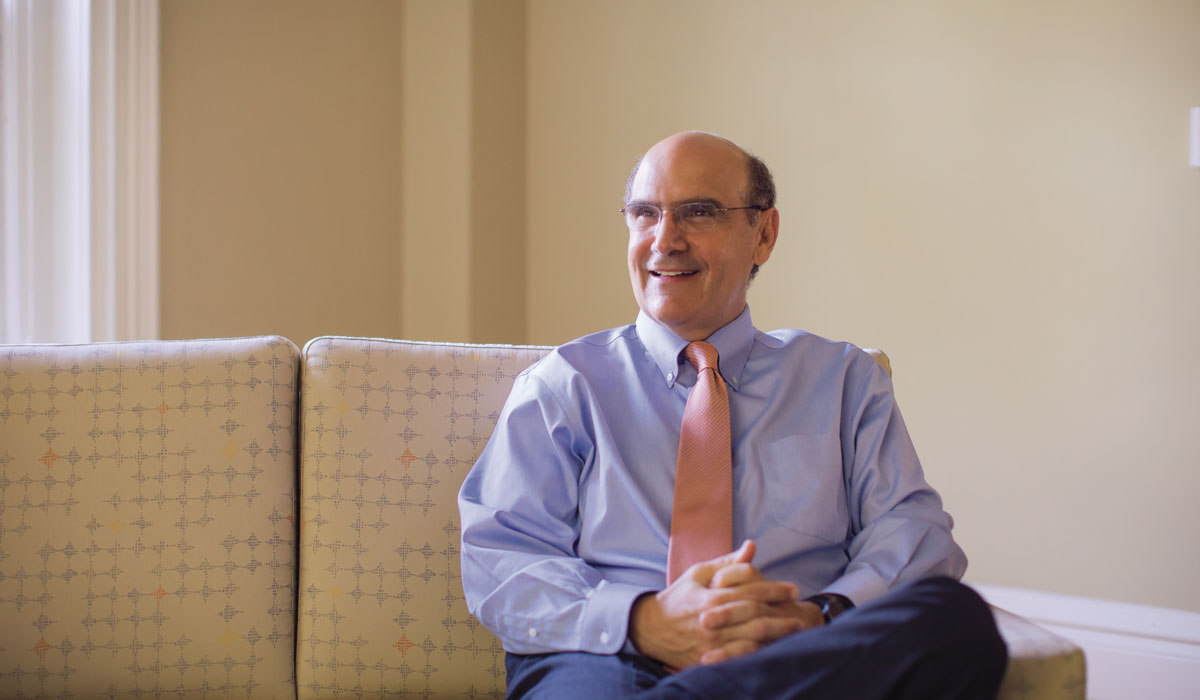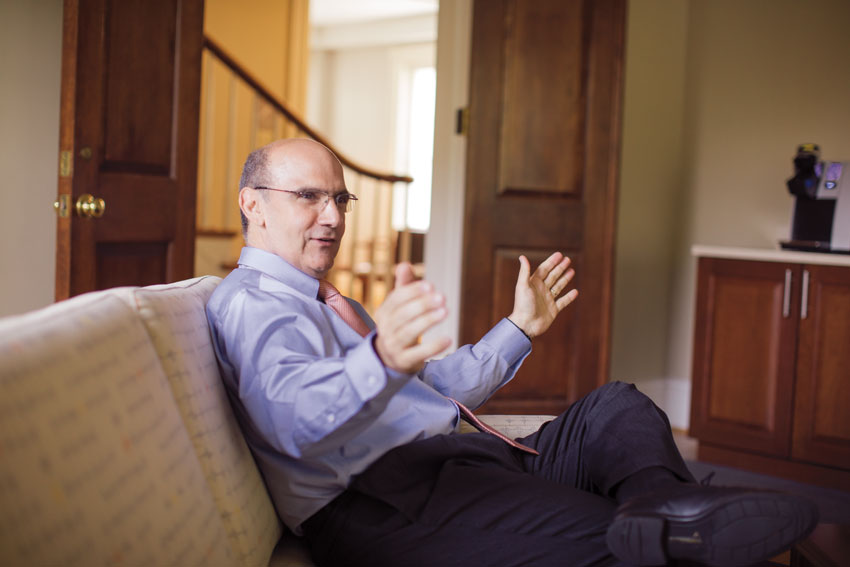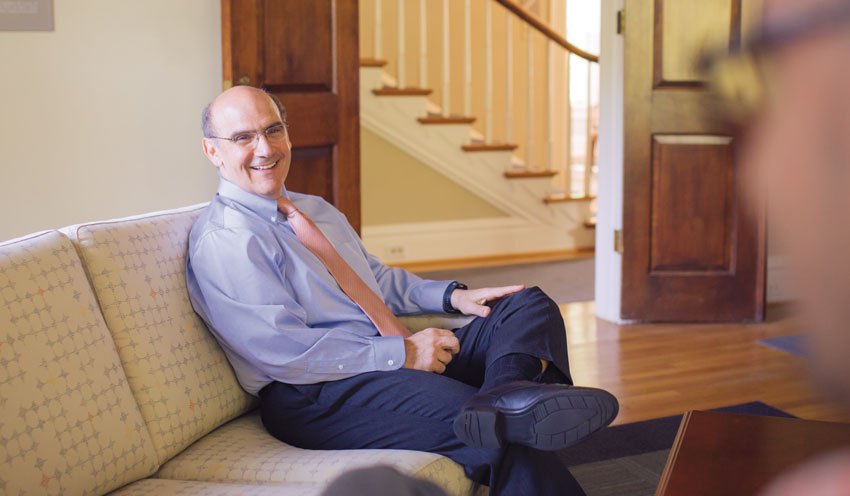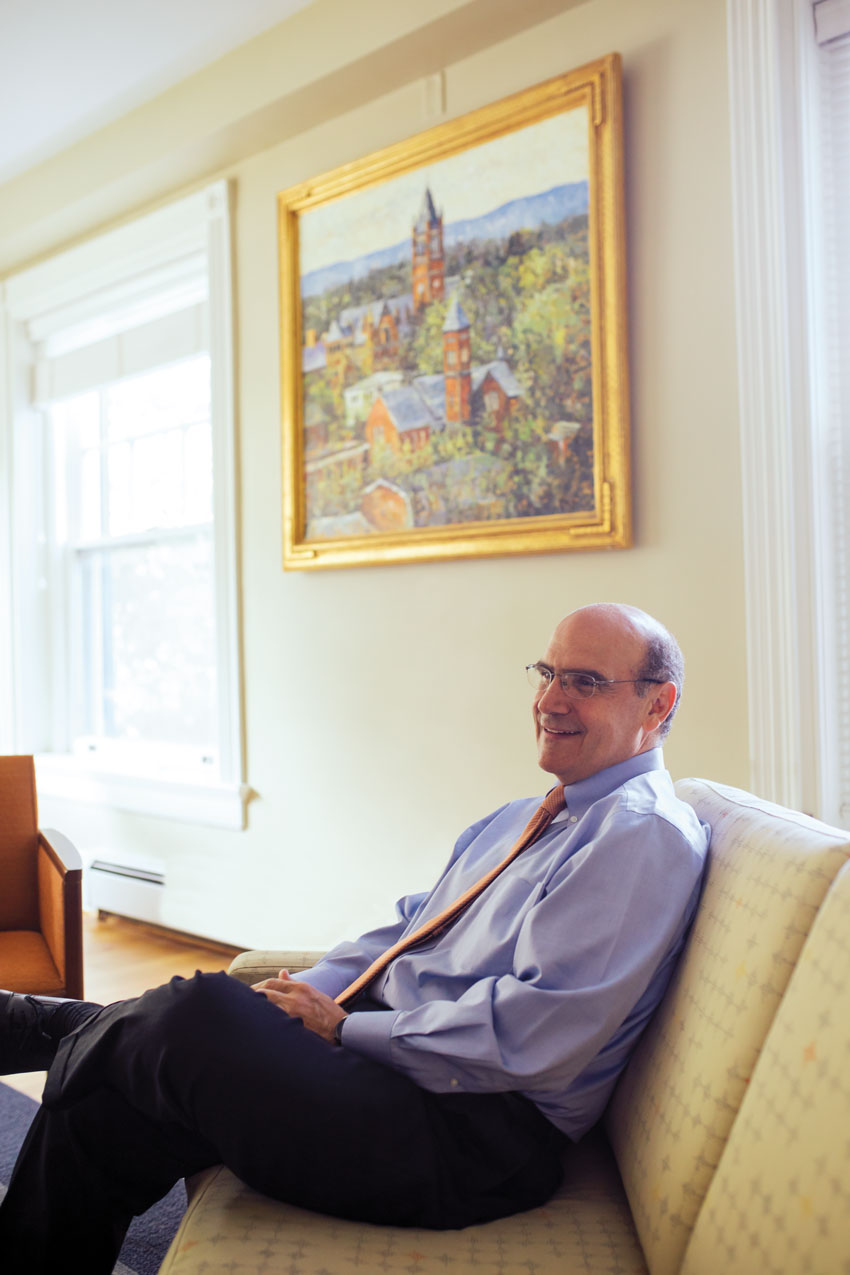
President Robert W. Iuliano draws inspiration from Gettysburg College’s distinctive 187-year history, but his vision for an intellectually vibrant community is nothing if not forward-thinking.
In September, Bob Iuliano was officially installed as Gettysburg College’s 15th president. Many of you responded to our call for questions for our new president. Coming to Gettysburg from Harvard University—where he was Deputy to the President, Senior Vice President, and General Counsel—Iuliano expressed excitement about his first year’s work, including getting to know Gettysburgians from across the country. If his answers here are any indication, the conversation is just getting started.
Gettysburg College Magazine: What originally made you fall in love with Gettysburg?
Bob Iuliano: Gettysburg College is a remarkable institution, sitting at the intersection of a defining moment in American history, and yet with a determined eye to the future. I was immediately taken by the College’s sense of self. On top of that, the people are remarkable: warm, open, and committed to doing the very best by our students. Susan and I are thrilled to be joining this special community.
GCM: Joshua K. Alley ’15 asked how you will ensure a Gettysburg education remains affordable given ongoing tuition increases?
BI: This is an important question and one that will be at the forefront of my mind as I learn more in the months to come. It is also something all of higher education is seeking to address. For now, let me underscore my agreement with the premise of the question. Gettysburg College seeks to educate people who will make a difference in their communities and the world. We will continue to achieve that goal only if the most talented students are able to afford to attend the College and to take advantage of the distinctive education we offer.
GCM: On Instagram, @earltr (Earl T. Redding ’00) asked what does “Do Great Work” mean to you?
BI: It starts on an individual level and depends on one’s personal goals and philosophy. Those goals could be focused in the arts, sciences, medicine, public service, business, law, sports, or in something else altogether—what matters is that finding it is deeply personal and provides deep satisfaction when pursued. “Doing great work” then means fully diving in to the best of one’s ability.

GCM: Musselman Library asked what are you reading right now? In addition, if you could have every member of our campus community read one book, what would it be and why?
BI: Over the past several months, most of my reading has been devoted to books about the College, Abraham Lincoln, or the battle at Gettysburg, including Gettysburg by Stephen Sears and Killer Angels by Michael Shaara. I’m re-reading A Team of Rivals by Doris Kearns Goodwin and working my way through the book by Charles A. Glatfelter on the history of the College, given as a gift to me by [Vice Chair of the Board of Trustees] Charlie and Janette Scott ’77, P’09, P’12. Outside of those genres, the most recent book was the contemporary translation of The Odyssey by University of Pennsylvania professor Emily Wilson, the first major translation by a woman.
It’s tough to pick one book I’d like everyone to read—there are so many important works that warrant careful study. But, given the increasing polarization in our society, I’d recommend something that would help people navigate difference more effectively. A starting point: Robert Putnam’s Our Kids, which documents the profound changes in the town in which he was raised since his high school graduation. It speaks to difficulties in towns across America and helps gives context to realities confronting many of our citizens.
GCM: Richard A. Mitchell ’62 asked what actions will you take to conserve the political and philosophical diversity of the student body necessary to have a civil discussion of the present issues facing our nation?
BI: A vibrant educational environment requires exposure to difference of various types—of life experience, of background, and of viewpoint. It is through the encounter with difference that students—indeed, all of us—are forced to confront their assumptions about the world and to interrogate their own beliefs. It also helps cultivate the capacity to navigate pluralism and difference, increasingly essential skills. In short, creating a diverse and interactive community is a necessary precondition to everything else the College seeks to do. This means that a responsibility held by the entire institution, including its president, is to ensure that a diversity of voices is heard on campus. In addition, when we demonstrate through our actions that we value and support diversity of all types, it helps reinforce the point that diversity in its various forms is a source of strength.

GCM: Several questions from our readers centered on diversity and inclusiveness. Megan bartells Shelly ’02 asked how do you plan to empower marginalized voices? How will you provide opportunities for underserved populations to attend and thrive at Gettysburg?
BI: A dynamic and effective educational environment starts with the condition that students have the opportunity to be their best selves and to do their best work. This requires intentionality on the part of the College to ensure that it is recognizing and responding to the concerns of groups that have historically been underrepresented, if represented at all, on campus. Listening is essential—and, for this reason, shortly after my announcement, I asked to meet with underrepresented students to gain their perspective on the campus. To be sure, this is just a first step in the work of addressing the structural and cultural issues that are preconditions to the creation of a truly inclusive environment. Among other things, we must help ensure that the entire community has a sound understanding of the different life experiences reflected within our population.
...what matters is that finding it is deeply personal and provides deep satisfaction when pursued. ‘Doing great work’ means fully diving in to the best of one’s ability.”
GCM: Stetson “Tack” Eddy ’72 said, “I would like to know more about Bob’s early years. What makes him tick? Where did he grow up and attend high school? What sports did he play, what jobs did he hold, and what were his outside interests? I would also like to know whether he practiced law, and where, before entering academia.”
BI: I grew up in a middle-class town outside Boston. All four of my grandparents were immigrants, and my parents were the first in each of their families to pursue higher education. I played football and wrestled in high school and played one year of football in college. I have in fact practiced law—I clerked for a federal appellate judge upon graduating from law school, practiced in a law firm for several years, served as a federal prosecutor for several more, and then moved to Harvard, where my job had both law and non-law responsibilities. I am an avid runner, always seeking to improve my time (who isn’t?), and enjoy photography—both taking and viewing. As for what makes me tick, I’ve always sought to engage in work that has a service aspect to it—something that directly contributes to the common good, which is why coming to Gettysburg College and serving this community is so attractive.
 GCM: “What do you feel you can do to increase the national visibility and recognition of Gettysburg College?” asked Robert A. McCown ’73.
GCM: “What do you feel you can do to increase the national visibility and recognition of Gettysburg College?” asked Robert A. McCown ’73.
BI: The College has a strong national reputation, earned from nearly 200 years of hard work by faculty, trustees, staff, alumni, and students. I share the desire to deepen our national footprint further. We start with such inherent advantages—a distinctive history; a location that connects to Washington, Baltimore, Harrisburg, Philadelphia, and elsewhere; units, such as The Eisenhower Institute, the Center for Public Service, and the Civil War Institute, that not only offer our students compelling experiences, but that also have the potential to serve as conveners of important conversations; and remarkably talented faculty who speak on topics that matter to society. I expect to be purposeful in taking advantage of these strengths and opportunities—including the opportunities presented to me by my office—to project the College and its people more fully into national conversations.
GCM: What are you most looking forward to in your first year as president?
BI: Getting to know the people better! Meeting students, watching them on the playing fields, on the stage, and in the classrooms; celebrating the accomplishments of our faculty and staff; saying hello to alumni, parents, and friends who are so supportive of the College; and building enduring relationships with the community in which we live.
Photos by Miranda Harple
Posted: 10/01/19